![]()
"Magyarorszagon szulettel, es magyarul beszelz. Edesanyadtol tanultad az elso szavakat. Ez az anyanyelved. Olyan termeszetes, hogy magyarul beszelsz, mint az, hogy kek vagy barna a szemed, es hogy ket kezed van. A szemeddel latod a korulotted levo vilagot, a kezeddel megfogod targyait, a beszeddel meg nevet adsz nekik. Ki tudod fejezni, amit gondolsz es erzel ..." -- Tanuljunk magyarul, Sarosy Jozsefne.
Translation: "You were born in Hungary, and you speak Hungarian. From your dear mother you learned your first words. This is your mother tongue. It is as natural that you speak Hungarian, as that your eyes are blue or brown and that you have two hands. With your eyes you see the world around you, with your hands you grasp its objects, with your speech you give names to them. Who can imagine, what you think and feel ..."
Only fifteen million people worldwide speak Hungarian -- a mere drop in the global linguistic ocean. It is forever a stranger among the Germanic, Slavic and Romance languages that surround it. Oh, but I love this beautiful though difficult language, its very poetry in prose, its strong and meaty cadence -- such a reward for struggling to comprehend its complexity!
Paul Lendvai writes in "The Hungarians," for which I spent my birthday money this year:
"Except for the Albanians, the Hungarians are the most lonely people of Europe, with their unique language and history..."
One can clearly hear the passion and the pathos in their national anthem, Isten aldd meg a Magyart, (God Bless the Hungarian), a prayer for strength, a prayer for survival. One can feel it, and one never forgets it.
To be so unique, is both a blessing and a curse.
Reading those lines by Ms. Josefne, I imagined bright-eyed kids in a Hungarian classroom, opening up that grammar book on the first day of school and agreeing with her that speaking Hungarian is as natural as the color of one's eyes. In years to come, they will realize that their beautiful language comes to an abrupt halt beyond their borders, with only ethnic enclaves here and there in which it can still be heard.
Monday, December 29, 2008
Hungarian meditations ...
Posted by
Eastcoastdweller
at
5:08 PM
2
comments
![]()
Labels: Hungarian
Friday, August 3, 2007
A loaf of bread .... and thou!
Kumusta po kayo?
That's "hello, how are you," in Tagalog, the principal language of the Philippines.
It's the "formal" way to say it.
I find it fascinating that from England to Spain, Hungary to the aforementioned Philippines, pretty much all over the world, languages recognize a formal and an informal level of speaking. Spanish has tu and usted, Hungarian teged and on.
English has it, too. Or had it. In the old days, thou and thee were the informal, and you was formal. Eventually, all of us English speakers (except the Quakers, apparently) simply started speaking in the formal tense to each other and thee and thou became quaint, archaic, rarely used, its original intent forgotten, preserved and used only in ecclestiastical and scriptoral settings.
Posted by
Eastcoastdweller
at
10:31 AM
5
comments
![]()















